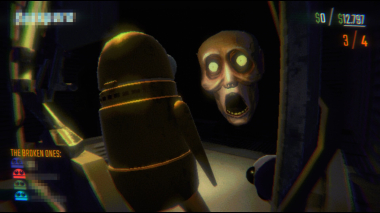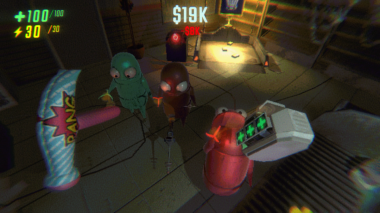My Initial Encounter with R.E.P.O.
I remember the first time I booted up R.E.P.O. Game on a quiet evening. The screen flickered to life, and I was immediately drawn into a world that promised an adventure unlike any other. I had been following its development for months, eagerly anticipating its release. The game’s title, R.E.P.O., echoed in my mind as a hint that something profound was at play—a combination of intricacy, unpredictability, and sheer excitement. The opening cinematic and fluid animations captivated me from the very start, setting the stage for what would become a remarkable personal journey.
Immersive Gameplay Mechanics
As I delved deeper into R.E.P.O., I discovered its gameplay mechanics held a refreshing twist on familiar genres. The controls felt both unique and natural. Each interaction with the environment was meticulously refined; the responsiveness of the controls provided a sense of fluid mastery over the character. I explored various movement techniques and combat maneuvers that required both a light touch and careful deliberation, making every encounter feel like a study in timing and precision. The game rewarded my efforts with an engaging level of unpredictability that compelled me to experiment and strategize consistently throughout my play sessions.
Innovative Quest Structure
The quest structure in R.E.P.O. struck me as both innovative and beautifully layered. Instead of following a linear path, the quests branched into numerous subplots, allowing me the freedom to explore narratives in a non-restrictive manner. I found that the side missions were not mere fillers but integral to the evolution of the game’s universe. Each quest was designed with deep storytelling elements combined with interactive puzzles, encouraging me to not only use my logical skills but also to embrace creative problem-solving. Venturing off the beaten path revealed surprises that continually redefined what an adventure game could be.
Stunning Visual Aesthetics and Design
The visual design of R.E.P.O. was one of the game’s most arresting features. Its art style blended a modern digital flair with retro-inspired elements, creating an immersive world that felt both nostalgic and forward-thinking. Every frame was a visual masterpiece, where vibrant landscapes merged seamlessly with darker, more surreal environments. The lighting effects and carefully chosen color palettes not only enhanced the realism of the scenes but also evoked strong emotions as I traversed unfamiliar territories. I found myself pausing frequently to appreciate the beauty of each vista, a testament to the care and creativity invested in every frame.
Multi-Layered Storytelling
The narrative of R.E.P.O. went beyond superficial storytelling. I was enveloped by a tale that interwove personal growth with larger existential questions. The dialogues were sharp and thought-provoking, prompting me to contemplate the motivations behind every character. There was an inherent philosophical underpinning that made me reflect on the nature of existence and the choices one makes, both within the game and beyond. Every interaction built the world in layers, each conversation and twist adding nuance to a tapestry of human emotion and ambition, turning the act of observation into a deeply personal introspection.
Refined World Exploration
The design and execution of the world were nothing short of remarkable. R.E.P.O. offered a sprawling environment that encouraged genuine exploration. I was invited to roam across diverse terrains, each with its own set of challenges and secrets. Whether I wandered through serene, vibrant fields or navigated eerie, labyrinthine corridors of abandoned cities, every location was meticulously developed to evoke a distinct mood. The open-ended design allowed me to linger in corners that appealed to my sense of curiosity, always discovering unexpected details that made the game world feel alive and interconnected.
Dynamic Soundscapes
The sound design in R.E.P.O. played an indispensable role in heightening the experience. The ambient music and carefully orchestrated sound effects enriched every moment, whether I was engaged in a heart-pounding chase or quietly exploring a forgotten trail. I noticed how the soundtrack adapted to the pace of the action, creating an underlying rhythm that intensified suspense and deepened immersion. Additionally, the voice acting was top-notch, conveying character depth and authenticity. I found that even the quietest notes in the background hinted at hidden stories, inviting me to listen more intently with each step I took deeper into the game.
Rich Character Interactions
One of the features that resonated with me was the variety of interactions I could engage in with the diverse cast of characters. The character development felt genuine, and dialogues were written in a way that revealed individual backstories over time. I engaged in conversations that ranged from light-hearted banter to serious exchanges about morality and fate. These interactions fostered a deeper connection with the world, making it not just a collection of obstacles and puzzles but a community of individuals with their own ambitions and dreams. The dynamic exchanges made every meeting a memorable encounter that added emotion and perspective to my journey.
Strategic Depth and Layered Combat
The combat mechanics of R.E.P.O. offered a level of strategic depth that kept me fully engaged. Each battle was a test of both tactical acumen and reflexes, requiring me to think several steps ahead. I learned quickly that every enemy possessed distinct behaviors, and understanding these nuances was key to overcoming challenges. The rich combination of offensive techniques and defensive maneuvers meant that I was rarely left with the notion of repetitive actions. Instead, I felt truly rewarded for honing my skills and adapting my strategies to suit the evolving dynamics of each combat scenario. The system was designed to continuously refine itself, demanding both ingenuity and adaptability from the players.
Intricate Puzzle Integration
Puzzle elements in R.E.P.O. were seamlessly woven into the gameplay, contributing diverse layers of challenge and engagement. Rather than feeling tacked on, the puzzles were indispensably interrelated with the storyline and the exploration process. I encountered elaborate mechanisms and riddles that required logical analysis and creative thought. The satisfaction of figuring out a complex puzzle was immense, and each breakthrough provided a sense of accomplishment that resonated throughout the game. These moments of clarity and reward were balanced beautifully with the adrenaline of action sequences, creating a rhythm that prevented the experience from ever feeling monotonous.
Adaptive Controls and Intuitive User Interface
The user interface in R.E.P.O. was a masterclass in design simplicity and functionality. I appreciated how the game seamlessly adapted to every phase of my journey, from calm exploration to high-adrenaline challenges. The layout of menus was intuitive, and the customization options enabled a personalized gaming experience. Whether I was mapping out a new area or reviewing my progress, the interface was never intrusive, letting me dive into the details without breaking immersion. The refined control scheme catered efficiently to both seasoned players and newcomers, inviting me to refine my approach with every new challenge I faced. The meticulous attention to detail in the interface reflected the developers' deep understanding of user needs and preferences.
Community Engagement and Developer Passion
What truly distinguishes R.E.P.O. Game from many other titles is the evident passion and dedication of its development team. Since its release, I have been impressed by the frequent updates and the transparent communication from the designers. I followed several community forums where fellow enthusiasts shared their experiences and insights, and it was clear that the game bridged gaps between creators and players. The developers actively listened to user feedback and continuously refined the game world, adding fresh content and addressing any imbalances or issues promptly. This proactive approach created an atmosphere of mutual respect and enthusiasm, and I often felt that my opinions genuinely mattered within the broader community.
Exhilarating Risk and Reward System
R.E.P.O. introduced a risk versus reward system that fundamentally altered the stakes of every encounter. I discovered early on that the game rewarded bold approaches while also providing safeguards to cautiously traverse its danger zones. Every decision I made—from exploring uncharted areas to facing formidable adversaries—was underscored by an appreciation of risk. This system made the game significantly more dynamic, as success was constantly balanced against potential setbacks. I enjoyed the constant evaluation of my tactics, balancing aggressive strategies with careful planning. The adrenaline rush that came from knowing that every step could lead to unexpected outcomes added an unforgettable layer of excitement to my journey.
Customized Player Progression and Upgrades
One of the areas where R.E.P.O. truly shined was its depth in player progression. I appreciated the well-thought-out upgrade system that allowed me to tailor my abilities and strategies as I advanced. Every level was an opportunity to enhance my character through various paths, each with its own benefits and challenges. This customizable progression was more than just a numerical increase—it was a way to tell a personal story of growth and perseverance. I found myself experimenting with different combinations of traits and skills, each contributing uniquely to my overall play style. The constant sense of improvement and personalization made every session feel rewarding and unique.
Exploration of Hidden Narratives and Easter Eggs
Another aspect of R.E.P.O. that filled me with wonder was the incorporation of hidden narratives and cleverly placed easter eggs. As I navigated through the intricately designed world, I discovered subtle hints and behind-the-scenes stories that enriched the lore. These small details, ranging from cryptic messages left on walls to secret meeting places, hinted at the broader mysteries hidden within the game’s universe. The thrill of uncovering these secrets kept me constantly engaged, giving me reasons to revisit certain areas. It was a masterful balance of overt storytelling and hidden lore that rewarded the observant and curious minds, turning every playthrough into an adventure of discovery.
Fluid Integration of Technology and Tradition
What struck me most about R.E.P.O. was its ability to merge modern digital innovations with traditional game design. The interface and technological enhancements reminded me of cutting-edge developments in the gaming industry, yet the core narrative and aesthetic elements bore the mark of classic storytelling. This juxtaposition created an environment where every new feature felt like a well-integrated part of a larger legacy. I was delighted to see how the developers combined fluid, adaptive technology with timeless design principles, making each interaction feel both innovative and comfortingly familiar. The game encouraged me to view progress not as a departure from tradition but as an evolution that honored the best of both worlds.
Engaging Social Elements and Co-Operative Play Opportunities
While R.E.P.O. is fundamentally a single-player experience, I was pleasantly surprised by its subtle incorporation of social elements. The game occasionally featured cooperative challenges that allowed for pairing with online acquaintances. These instances provided shared moments of achievement and friendly competition. I found that interacting with other enthusiasts, even if only through occasional joint endeavors, enriched the experience. The social features were designed to be unobtrusive, yet they added a layer of communal engagement that made me feel like a part of something larger. The interactions, whether direct or through shared discoveries, fostered a sense of camaraderie that elevated the overall experience.
Adaptive Story Threads and Nonlinear Narrative Delivery
R.E.P.O. impressed me with the way it handled its narrative architecture, branching away from the conventional format. I engaged with various story threads that defied the typical linear progression. The decisions I made early on had ripple effects that manifested later in the gameplay, from altering character relationships to changing the dynamics of entire regions. This nonlinearity turned every choice into an opportunity for creative expression. I felt that my actions were genuinely influential in shaping the game world, and each decision carried weight and consequence. The adaptive narrative structure made every playthrough feel fresh, as the game responded intelligently to my personal journey, ensuring that no two experiences would ever be identical.
Screenshots







